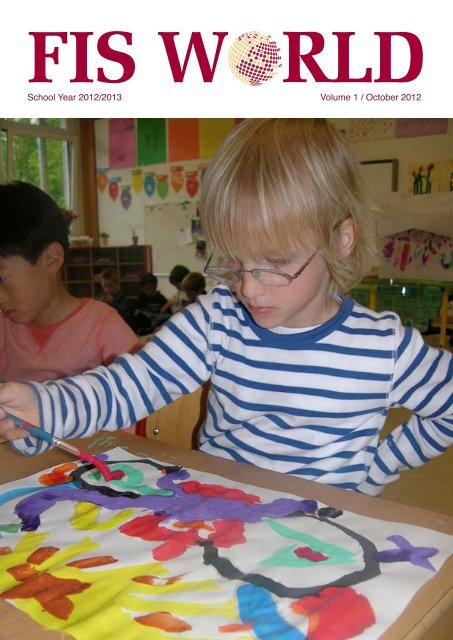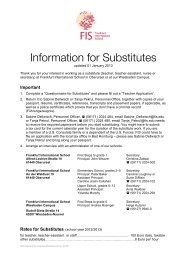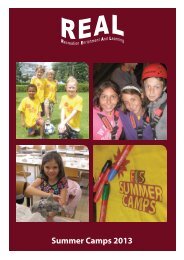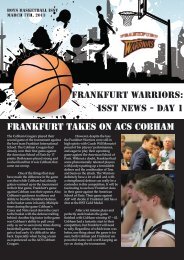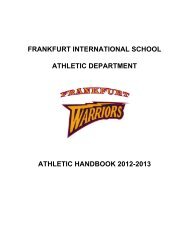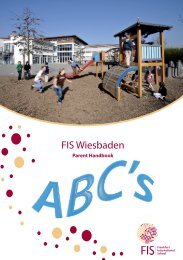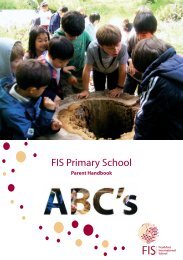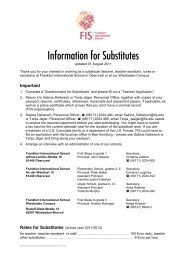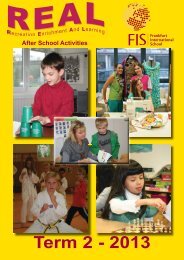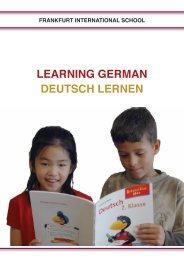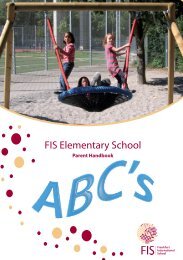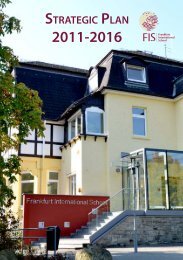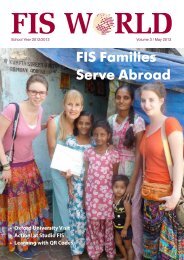Every Picture Tells a Story - Frankfurt International School
Every Picture Tells a Story - Frankfurt International School
Every Picture Tells a Story - Frankfurt International School
Create successful ePaper yourself
Turn your PDF publications into a flip-book with our unique Google optimized e-Paper software.
FIS W RLD<br />
<strong>School</strong> Year 2012/2013 Volume 1 / October 2012<br />
<strong>Every</strong> <strong>Picture</strong><br />
<strong>Tells</strong> a <strong>Story</strong><br />
• FIS Visits Harvard<br />
• FISW Students in Spain<br />
• Alumni Gather in Chicago
Our mission is to be the leading, culturally diverse and family-oriented<br />
international school with English as the principal language of instruction.<br />
We inspire individuals to develop their intellect, creativity and character to<br />
become independent, adaptable, socially responsible and internationally<br />
minded citizens, by ensuring a dynamic, inquiry-driven education of the<br />
highest standard.<br />
Content<br />
Reach for the Stars 2<br />
Building Strong Bonds at FIS 4<br />
Chicago Reunion 5<br />
New Upper <strong>School</strong> Library 6<br />
Moms on the Run 8<br />
Finding a Post FIS-Fit 9<br />
FIS Athletes Climb in ISST Standing 10<br />
A Lesson in Community 12<br />
Primary Colors 13<br />
The Trailing Spouse 14<br />
Canadian Rainforest Experience 16<br />
A Rolling Stone Gathers No Moss 18<br />
Obituary - Margret Poulgrain 20<br />
FISW Students in Barcelona 21<br />
The New Face(book) of FIS 22<br />
New Playground at Wiesbaden Campus 24<br />
FIS World is made possible through the efforts of our volunteer team of writers,<br />
photographers and editors. If you are an FIS parent and would like to join our team<br />
and contribute to this magazine, please contact Alec Aspinwall at alec_aspinwall@fis.<br />
edu. The only experience required is a passion for our students and their education.<br />
FIS World October 2012 1
HoS Paul Fochtman<br />
talking ‘space’ with<br />
FISW students<br />
Reach for the Stars<br />
As I travelled home this summer, I<br />
watched a bit of news at the<br />
airport and saw a space shuttle<br />
being flown on the back of a 747 to a<br />
museum somewhere up the Hudson<br />
River. Throngs of people watched as<br />
this impressive spacecraft made its<br />
way to its final resting place. While I<br />
was fascinated by the event, I found<br />
myself also saddened at what<br />
seemed to be the end of an era of<br />
space exploration. I couldn’t help but<br />
wonder if our race had reached its<br />
limits in space, and we would no<br />
longer be awed with news such as<br />
the landing of a man on the moon or<br />
the launch of an international space<br />
station.<br />
A couple of months passed with not<br />
much space news, and then to my<br />
surprise, a craft named Curiosity was<br />
sending images back from Mars! My<br />
fears of space-age-stagnation were<br />
unfounded. Behind the scenes<br />
scientists were at work creating<br />
another great leap, even though that<br />
leap was likely only possibly after<br />
years of incremental inching forward<br />
towards their goal. Before you begin<br />
to ask “What planet is he on?,” let me<br />
explain how I found space<br />
exploration and education to be in<br />
the same orbit.<br />
Often we choose not to pursue<br />
momentous goals because they seem<br />
simply unattainable. Rather than<br />
“reaching for the moon,” we stay in<br />
our comfort zones rather than risk<br />
failure. At our first all-faculty meeting<br />
I shared a TED Video by Matt Cutts<br />
– “Try Something New For 30 Days”<br />
http://www.ted.com/talks/matt_cutts_<br />
try_something_new_for_30_days.html<br />
The essence of his message was to<br />
escape our comfort zones and try<br />
something new for thirty days. It was<br />
a challenge I’ve accepted and I<br />
challenged our faculty to do the<br />
same. The new daily habit can be<br />
anything from a new exercise routine<br />
to intentional acts of compassion.<br />
Since this meeting I have heard from<br />
a number of faculty who are trying<br />
the 30-day challenge and I would<br />
encourage you and your family to<br />
consider it as well. Consider<br />
watching the Ted Talk video and<br />
attempting something that you may<br />
have previously thought to be too<br />
difficult. The short time frame of 30<br />
days ensures that the end is not far<br />
off, but the incremental gains you<br />
make each day may add up to a<br />
surprising outcome.<br />
Education and space travel both<br />
require a vision to go beyond the<br />
status quo, to break through the<br />
gravitational pull that keeps us firmly<br />
planted where we’ve always been.<br />
Maybe the only difference is that<br />
space travel requires people to look<br />
up and dream of great feats, while<br />
education calls us all to look within to<br />
fulfill our dreams. It is the start of a<br />
new school year, the slate is clean<br />
and the possibilities are endless. I<br />
hope you and your children are<br />
finding everything you could possibly<br />
need to “reach for the stars” at FIS.<br />
Paul Fochtman,<br />
Head of <strong>School</strong><br />
FIS World October 2012 3
Building Strong<br />
Bonds at FIS ore than 100 FIS alumni of the<br />
M‘60s, ‘70s and ‘80s from all over<br />
the globe braved the Chicago heat<br />
There are many high aspirations<br />
embedded in the FIS Mission<br />
Statement. We are committed to inspire<br />
individuals to be “independent”,<br />
“adaptable,” and “internationally<br />
minded,” all while pursuing an education<br />
of the “highest standard.” And<br />
while much of our Mission Statement<br />
is concerned with what happens<br />
within the school, it also calls us beyond<br />
our campus as we strive to be a<br />
“family oriented” institution.<br />
Regardless of our own cultural background,<br />
most of us would agree that<br />
it is the strength of our family bonds<br />
that has the greatest influence on our<br />
quality of life. Although our personal<br />
and professional daily routines will<br />
undoubtedly offer us both highs and<br />
lows, it is our family bonds that keep<br />
us secure. Family support is the safety<br />
net that allows students to take the<br />
appropriate risks as they need to<br />
grow and develop emotionally and<br />
intellectually, and it is the hand that<br />
reaches out to us when we need to<br />
be picked up, brushed off, and sent<br />
forth again after a fall.<br />
The best schools understand that<br />
their role extends beyond what happens<br />
to students after they leave the<br />
campus. That is why FIS makes every<br />
effort to help families adjust when<br />
they move to Germany, encourages<br />
ongoing parent involvement in the<br />
life of our school, offers adult classes<br />
through our REAL program, and encourages<br />
parents to utilise our school<br />
counselors when challenges arise. By<br />
the time this FIS World issue is published,<br />
I expect we will also have<br />
Facebook groups established to support<br />
parents social networking as<br />
well.<br />
While our school invests a great deal<br />
of time and energy to support the<br />
relationships within our school, our<br />
mission also calls us to be “socially<br />
responsible,” which calls us to be sen-<br />
sitive to the needs outside of our<br />
school as well. FIS opens its facilities<br />
to community sports teams, has<br />
worked hard to gain Eco <strong>School</strong> status,<br />
sends students and resources to<br />
projects in the Kalahari and Poland,<br />
and our faculty and students regularly<br />
participate, when invited, to join or<br />
co-sponsor events to support fellow<br />
non-profit organizations.<br />
As we start a new school year, please<br />
be assured that your Board of Trustees<br />
is aware of the needs of the<br />
school, the needs of our families, and<br />
the broader needs of the public community<br />
as well. Please let us know if<br />
there are ways that FIS can reach out<br />
to you or your community to make<br />
these important bonds even stronger.<br />
Mike McKay,<br />
Chair Board of Trustees<br />
Chicago Reunion<br />
(40° C/104° F) in July to share a<br />
weekend of great times and fond<br />
memories of their good ol’ days at<br />
FIS. The event was brilliantly<br />
organized by Sharon Arnold (’79),<br />
Chris Cataldo (’76), Jan Cetan Neisler<br />
(’72), Denise Davis (’77), Elizabeth<br />
Bettina Herr (’76), Nicole Hetzel<br />
Cassidy (’78), Lisa Pantolin Martinez<br />
(’86), and Susan Tuerff Wasmund<br />
(’72), – thanks to their time, effort,<br />
and creativity, the reunion was a<br />
great success and memorable<br />
occasion for all. FIS alumnus and<br />
Board of Trustees member, James<br />
Dilworth (‘74) and Tina Shealy, FIS<br />
Manager of Development and<br />
Alumni Relations also took part in the<br />
activities which included a kick-off<br />
party at the Chicago Brauhaus (for a<br />
taste of the past) , an architectural<br />
boat tour of downtown Chicago, and<br />
a festive dinner at the famous Harry<br />
Caray’s restaurant. Among the alumni<br />
were the five Naegli siblings who all<br />
attended FIS in the ‘70s as well as the<br />
first FIS alumni married couple! The<br />
events were abuzz with laughter and<br />
chatter as alumni shared FIS<br />
yearbooks, photos, sport uniforms<br />
and other memorabilia and told their<br />
favorite stories of their special years<br />
at FIS. Despite the decades passed,<br />
the FIS spirit is as strong as ever in<br />
the hearts of our alumni community.<br />
Tina Shealy,<br />
Manager of Development and<br />
Alumni Relations
New seating in<br />
the reading area of<br />
the library<br />
New Upper<br />
<strong>School</strong> Library<br />
On the second day of the new<br />
school year, the FIS Upper <strong>School</strong><br />
Library revealed the fruits of its summer-long<br />
renovation to many excited<br />
students.<br />
The immediate reaction was such<br />
that it suggested the new look was a<br />
huge success. A few days on, encouraging<br />
comments by students who<br />
had actually used the redesigned library<br />
confirmed that was truly the<br />
case.<br />
The most frequently used word has<br />
been “awesome”. The best quote has<br />
to be “I am actually coming here to<br />
study!” from a senior. It has also been<br />
good to see students thinking critically<br />
– a few thought the place<br />
needed more color as well as other<br />
constructed comments that were<br />
shared.<br />
We are delighted to offer our students<br />
this comfortable, modern and<br />
peaceful learning space, in addition<br />
to the much-adored atrium. Both<br />
areas are busy with students.<br />
The library’s main floor space was<br />
maximised, with a 30% increase in<br />
seating. We achieved this by reducing<br />
the size of the storage room and<br />
no longer having a separate librarian’s<br />
office.<br />
The new layout opens up the space<br />
and creates scattered “nooks” at the<br />
same time. We hope every student<br />
can find a seat here to suit his or her<br />
purpose and mood.<br />
As well as desks with table-top lamps<br />
and fully-upholstered chairs, we have<br />
created space-saving “study bar” seating<br />
with stools along the two rows of<br />
windows – great spots for independent<br />
study in natural light.<br />
Another new feature is the Collaboration<br />
Room, equipped with a SMART<br />
Board. Here, students can study in<br />
groups or practice oral presentations.<br />
There are also two comfortable areas<br />
for reading, each with a rug. The<br />
semi-circle centerpiece has display<br />
shelving on the outside and benchstyle<br />
seating on the inside, creating a<br />
cocoon where students can read together.<br />
The other is the reading<br />
corner at the back, with six “cool”<br />
armchairs, surrounded by magazines,<br />
newspapers and graphic novels.<br />
Our computer lab – relocated to one<br />
side – and viewing room, big enough<br />
for a whole class, continue to fulfill<br />
our instructional needs.<br />
We must not forget the books! The<br />
new shelves are configured to maximise<br />
book space with room for<br />
growth. Our keen readers are always<br />
looking for new material!<br />
Some of the students who graduated<br />
last year helped us pack up the library<br />
before the Summer Break and<br />
unpack it afterwards. They rightly<br />
thought it was extremely unfair that<br />
they were not to benefit from this<br />
fabulous new space. We are convinced<br />
that the current students will<br />
do so on their behalf!<br />
Manatsu McCluksey,<br />
Upper <strong>School</strong> Librarian
Moms on the Run<br />
Most people view springtime as<br />
the time to get back in shape.<br />
For me, it’s the start of the school year.<br />
After a summer of a bit too much indulgence,<br />
I am happy to get in gear<br />
once again. My sport of choice is run-<br />
ning, and the day my children<br />
returned to school, I indulged in a<br />
wonderful long run (at moments, it<br />
was more like a shuffle I must admit)<br />
in the Taunus forest.<br />
At FIS as well as at other nearby organizations,<br />
there is no dearth of<br />
exercise choices - literally from A to Z<br />
(Aerobics to Zumba®). Through the<br />
FIS REAL Program, you can choose<br />
from a wide variety of adult exercise<br />
classes during the daytime and in the<br />
evening. The PTG is bringing together<br />
parents interested in tennis, hiking,<br />
biking, golf and basketball. Monday<br />
nights are the time to whack the birdie<br />
over the net during the free evening<br />
Badminton sessions at FIS.<br />
Additionally, through the American<br />
Women’s Club and/or The British Club,<br />
you can take part in active tennis<br />
groups, Nordic walking groups, family<br />
hikes, yoga and much more. The VHS<br />
- Volkshochschule - allows you to work<br />
on your German while engaging in<br />
diverse activities such as Marathon<br />
Training to Tai Chi to Pilates.<br />
Like most of you, over the years I’ve<br />
tried a variety of exercise options.<br />
While the type of exercise I choose<br />
may not always be to my liking, it’s<br />
great to move beyond my comfort<br />
zone and meet some new friends<br />
along the way! While I gear up to<br />
relay the <strong>Frankfurt</strong> Marathon with<br />
my “Team Zensational” partners, I<br />
encourage everyone to try a new<br />
activity, meet some new people and<br />
move beyond their comfort zone. In<br />
the meantime, I will heed the motto<br />
on my running partner’s t-shirt and<br />
“Run Like a Mother” for as long as I<br />
can!<br />
Martha Boston-Majetic,<br />
FIS Parent<br />
Finding a<br />
Post-FIS Fit<br />
USA College Admissions<br />
Admission to the most selective<br />
universities and colleges in the<br />
United States has become highly<br />
competitive. The number of applications<br />
to these schools has increased<br />
dramatically over the past ten years<br />
and has resulted in a corresponding<br />
surge in the industries that prepare<br />
college-bound students. In order to<br />
best understand recent changes, as<br />
well as to understand how FIS can<br />
best support its students applying to<br />
these highly competitive schools,<br />
Paul Fochtman, Jessica Angelidis and<br />
Alec Aspinwall travelled to Boston to<br />
attend a two-day seminar with college<br />
consultants and to meet with<br />
the Director of <strong>International</strong> Admissions<br />
at Harvard University.<br />
Reflecting on this experience, Dr.<br />
Jessica Angelidis and<br />
Paul Fochtman at the<br />
Harvard Gate<br />
Fochtman noted, “Many of our FIS<br />
graduates are ready to take on the<br />
most challenging college experiences<br />
available. While many of our students<br />
prefer Oxford, Cambridge or other<br />
great U.K. schools as their top post-<br />
FIS choices, we also want schools in<br />
the Ivy League and other leading<br />
schools in the USA to be equally<br />
accessible.”<br />
Jessica Angelidis, who counsels students<br />
applying to the USA added,<br />
“College placement is a process of<br />
finding the best fit between our students<br />
and their school of choice.<br />
While these selective schools may<br />
select only the top few graduates of<br />
each class, the principles we learned<br />
during this training can be applied to<br />
better support student admission to<br />
a wide variety of great American<br />
<strong>School</strong>s.”<br />
Last year, Harvard had over 30,000<br />
student applications from around the<br />
world for only 2,000 openings. Robin<br />
Worth, Harvard Director of <strong>International</strong><br />
Admissions, shared that it is an<br />
incredibly difficult process to determine<br />
which students are admitted<br />
given that most applicants have very<br />
similar high test scores and school<br />
grades. Ultimately, she said the students<br />
that are admitted are those<br />
whose histories suggest they will<br />
best support the challenging learning<br />
dynamic found within the school.<br />
In other words, admission to selective<br />
schools is not simply a reward for a<br />
student’s past achievement but an<br />
investment in what the student is expected<br />
to bring to a college in the<br />
future.<br />
FIS students should meet early in the<br />
year with their FIS counselor to discuss<br />
how to best prepare themselves<br />
for college admission. Through early<br />
planning and establishing realistic expectations,<br />
parents and students<br />
alike can reduce the stress involved in<br />
finding the right college or university<br />
for a FIS graduate.
FIS students<br />
leading the race at<br />
the Cross Country<br />
Meet<br />
FIS Athletes<br />
Climb in ISST<br />
Standings<br />
Throughout the school year, FIS<br />
athletes participate in sporting<br />
competitions throughout Europe and<br />
beyond, whilst competing in twelve<br />
different sports across three seasons.<br />
The highest level of competition is<br />
among the high school teams at the<br />
end of each season at the <strong>International</strong><br />
<strong>School</strong> Sports Tournament<br />
(ISST). With FIS as one of the founding<br />
schools in 1967, the ISST league<br />
now consists of 24 international<br />
schools that reach from London to<br />
Cairo.<br />
FIS has made great strides in the ISST<br />
competitions over the past several<br />
years. As recently as 2008, FIS ranked<br />
10th in the ISST standings. However,<br />
under the leadership of Kenny<br />
Macaulay, FIS Athletic Director, his<br />
staff and the support of the Athletic<br />
Booster Club, FIS has risen to second<br />
in the most recent ISST standings.<br />
Well done to all of the FIS athletes,<br />
coaches and parents! Should you<br />
wish to see our athletes in action,<br />
please visit http://www.fis.edu/<br />
under Athletics for all of the team<br />
schedules.<br />
GO WARRIORS!<br />
Martha Boston-Majetic,<br />
FIS Parent
A Lesson in<br />
Community<br />
There are lessons in life that are<br />
too important to delay teaching<br />
and too critical not to ensure their<br />
thorough understanding. At FIS, the<br />
teaching of the IB Learner Profile<br />
definitely falls into that category. “The<br />
IB Learner Profile guides and touches<br />
all that we do at FIS,” said Dr. Paul<br />
Fochtman, Head of <strong>School</strong>.<br />
The IB Learner Profile consists of the<br />
following ten words: Caring, Balanced,<br />
Principled, Communicators,<br />
Thinkers, Risk-Takers, Knowledgeable,<br />
Inquirers, Open-minded and Reflective.<br />
These words, sometimes referred<br />
to as “attributes”, are more than just<br />
highly inspirational descriptors. These<br />
are the words that students at FIS<br />
learn and live by.<br />
Dr. John Weaver, Principal of the Primary<br />
<strong>School</strong>, took on the challenge<br />
of how to better ensure students<br />
learn this critical lesson. Accepting<br />
that many of the students are not<br />
“formal readers” of any language, he<br />
looked elsewhere than the printed<br />
word and eventually looked through<br />
a camera lens to find the perfect<br />
solution.<br />
Dr. Weaver realized that through<br />
photos, specifically photos of Primary<br />
<strong>School</strong> students doing what they do<br />
everyday at school, he could begin<br />
the IB Learner Profile lesson with the<br />
young students. “Children don’t have<br />
to read to understand,” said Dr. Weaver.<br />
“I want a clear message about<br />
what we are about…the attributes of<br />
the IB Learner Profile. I want photos<br />
about learning, laughing, painting…a<br />
reflection of self, culture, personality,<br />
and friendships.”<br />
Grade 1 teacher Natalie Taylor joined<br />
Dr. Weaver and together they took<br />
hundreds of photos and chose<br />
approximately 30 to hang in the<br />
entrance-hall of the Primary <strong>School</strong>.<br />
“I love taking photos,” said Ms. Taylor.<br />
She added that the photo she appreciates<br />
most and “…is a good example<br />
of the thinking and inspiration<br />
behind this project…” is the following<br />
photo of two First Steps students.<br />
Ms. Taylor said, “Whilst I am sure a talented<br />
writer could probably convey<br />
the bond of friendship so evident in<br />
this image in fewer words than I, I<br />
can’t imagine they being able to do it<br />
with the same ease and clarity…” that<br />
this photo does.<br />
Ms. Louisette Winkler-Winkel, mother<br />
of three children at FIS said, “The<br />
pictures of the children placed on<br />
the walls are wonderful to look at.<br />
They reflect the various ways that<br />
the children are learning, interacting,<br />
communicating, discovering, listening<br />
or even playing.” Ms. Winkler’s<br />
Pre-Primary son asked his mother<br />
to pick him up, and then pointed to<br />
the photo of two boys and said with<br />
excitement “Mom, Daan is reading a<br />
book!”<br />
“Children should look around for<br />
signs that they are welcome. Children<br />
should see themselves, their cultures<br />
in photos,” shared Dr. Weaver. A new<br />
Pre-Primary student to FIS posed in<br />
front of the photo of another Korean<br />
girl wearing a “hanbok”, the traditional<br />
Korean dress. Cheung jin Baik,<br />
her mother, translated her daughter’s<br />
comments from Korean into English.<br />
“She really likes the photo. She said<br />
she now wants to wear a hanbok to<br />
school.” This desire to honor and celebrate<br />
one’s culture at FIS is definitely<br />
the intended response.<br />
Dr. Weaver spoke with pride and<br />
purpose about his shared efforts with<br />
Ms. Taylor to teach the IB Learner<br />
Profile. He condensed the list of<br />
ten “attributes” down to one word,<br />
“community.” He said “Learning to<br />
be a community member does not<br />
happen by chance. It is taught by<br />
teachers taking the time to teach in<br />
very purposeful ways throughout<br />
the days, weeks, months and years of<br />
each child’s school experience.”<br />
Emmett Kelly,<br />
FIS Parent<br />
Primary Colors<br />
While Ms. Taylor and Dr. Weaver<br />
were busy snapping photos,<br />
another team at the Primary school<br />
came-up with an equally creative and<br />
artistic idea--they wanted to paint<br />
the school.<br />
In April of 2011, the Pre-Primary team<br />
of Kristi McEwen, Fiona McArthur-<br />
Weber and Katherine McIntosh,<br />
travelled to southern Italy to learn<br />
about the Reggio Emilia approach<br />
to Preschools. The Reggio Emilia approach<br />
is well respected among early<br />
childhood educators, and known for<br />
its focus on the “third teacher.” “In<br />
Reggio Emilia Preschools there is a<br />
strong belief in the idea that the environment<br />
is the third teacher,” said Ms.<br />
McArthur-Weber. “The schools place<br />
an emphasis on the beauty and won-<br />
der of nature and using it creatively<br />
and aesthetically.”<br />
The Pre-Primary team returned to FIS<br />
with a vivid understanding of the influence<br />
of colors in nature, and in our<br />
lives in particular. “Color can affect a<br />
student’s attention span and perception<br />
of time. It can also affect mood<br />
and morale,” said Ms. McArthur-<br />
Weber who added, “Red and orange<br />
are stimulating, yellow is cheerful and<br />
blues and greens are calming.”<br />
Dr. Weaver agreed enthusiastically<br />
to adding more color to the Primary<br />
<strong>School</strong>, but made the request that<br />
the colors communicate two important<br />
ideas, “welcoming” and “warmth.”<br />
Sample colors, reproduced from<br />
Reggio Emilia colors, were painted on<br />
small sections of the Primary school.<br />
Feedback to these initial colors was<br />
not positive, but several more colors<br />
were presented, and pink, green<br />
and orange were eventually chosen.<br />
These colors are “pastels in harmony”<br />
said first grade teacher Janet Haughton.<br />
The new Primary school colors are<br />
resulting in positive feedback from<br />
parents for their aesthetic appeal.<br />
What is likely not noticed by every<br />
parent and student is that the<br />
Primary <strong>School</strong> has transformed the<br />
walls of the entry hall & stairs into a<br />
“third teacher” to teach the IB Learner<br />
Profile as well as encourage positive<br />
feelings.<br />
Emmett Kelly, FIS Parent
The Trailing<br />
Spouse<br />
Kids at school, furniture in place, new bank accounts squared…and now what?<br />
<strong>Every</strong> year, FIS welcomes over 250<br />
new families. The vast majority<br />
result from professional expatriation<br />
assignments, most of which are<br />
awarded to one spouse. The other<br />
spouse trails along.<br />
Trailing spouses, a moniker first<br />
printed by the Wall Street Journal in<br />
1981 to describe a person following<br />
his or her spouse on a foreign<br />
assignment, are left to grapple with<br />
the everyday necessities of life in<br />
unfamiliar and oftentimes<br />
incomprehensible territory.<br />
Anne Molyneux, mother of two girls<br />
in Elementary <strong>School</strong>, shares her<br />
experience and insights as a long<br />
term expatriate that arrived as a<br />
trailing spouse at FIS in Germany one<br />
year ago:<br />
“Our family moved to Germany in<br />
mid-July 2011 to accompany my<br />
husband, who had accepted a new<br />
posting. I had moved town, country<br />
and job several times in the past, but<br />
this was my first time with children, a<br />
dog, and no job for me outside the<br />
home.<br />
My first priority, when I was told we<br />
were moving, was to research the<br />
schools in Hessen, because if the<br />
children failed to settle, family life<br />
would be dire. Our first school-of-<br />
choice visit was FIS - where the ES/US<br />
cafeteria was bigger than the entire<br />
all-girl school they had gone to since<br />
they were three years old! We applied<br />
and fortunately got spaces for both<br />
girls.”<br />
This difficulty is compounded when<br />
the trailing spouse, as in Anne’s case,<br />
has a professional background in a<br />
high strung sector where working full<br />
time easily spills into your every pore<br />
and waking minute. “But it is<br />
possible”, she says.” When we got<br />
here, I noticed that there was a<br />
vacancy for a Vice-President on the<br />
PTG. I had met Maria Cantarero, the<br />
PTG President, the previous weekend<br />
at a barbeque; so I approached her<br />
after the meeting, and asked to be<br />
put forward for the position. Working<br />
in the PTG was a great way to get<br />
involved with school life - in fact, I<br />
liked it so much that I was re-cycled<br />
as PTG Secretary for this year.”<br />
Anne reflects that the easiest place<br />
to start speaking to new people is<br />
your own community, and that if<br />
speaking to a complete stranger in<br />
your new town seems “a bit scary”,<br />
the parent community at FIS is a<br />
great place to start approaching<br />
people, including local residents.<br />
In addition to her PTG and FIS<br />
substitute teaching work, Anne helps<br />
students learning math at Kumon<br />
Oberursel two afternoons a week.<br />
<strong>Every</strong>day, she walks the family<br />
Beagle, shops for groceries, and<br />
cooks. She helps her girls with playdates,<br />
sleepovers, homework,<br />
troubles, dreams and all that it takes<br />
to raise two happy children; and now<br />
that her German has gotten up to<br />
what she regards as a decent<br />
conversational level, she plans to<br />
switch from studying German to<br />
learning Italian.<br />
Does she have time to have coffee<br />
with friends? Yes, she does – I’m one<br />
to prove it. I ask Anne to offer four<br />
golden first year survival hints to the<br />
new trailing spouses just arrived at<br />
FIS. She tells me:<br />
1. Use your connections to find<br />
people you enjoy spending time<br />
with. You’ll be surprised how<br />
positively people respond when<br />
you reach out to them.<br />
2. Walk around your neighborhood<br />
and get to know it. You may run<br />
into other expats or FIS parents<br />
living in your area. Keep an ear<br />
out for your native language.<br />
3. Learn a bit of the local language.<br />
It will increase your confidence<br />
and you’ll be more at ease once<br />
you understand some of what is<br />
going on around you.<br />
4. Find something that gives you<br />
pleasure, and do it! You are the<br />
same person you’ve always been<br />
but simply need to find a way to<br />
nourish yourself in your new<br />
home.<br />
Maria Monteiro,<br />
FIS Parent<br />
“There are many opportunities for parents to engage at the school. For<br />
instance, you can get involved with the other parents in your children’s classes<br />
by volunteering to be a Homeroom Mom. If you really like sports, you can<br />
volunteer for the Booster Club, as they support all of the school’s athletes.<br />
There is the PTG for those who wish to be involved with the community. And<br />
from a long-term governance point of view, every year there are places to be<br />
filled on the school’s Board”, says Anne Molyneux.<br />
FISW students learning about advertising
Christina<br />
gathering plants<br />
and berries<br />
Canadian<br />
Rainforest<br />
Experience<br />
Wilderness <strong>International</strong> Ambassadors at FIS<br />
FIS is proud to have two “ambassadors<br />
in residence”, two Grade 11<br />
students who have earned their laurels<br />
in the rainforest on Vancouver<br />
Island in Canada this past summer.<br />
For Jamie and Christina, the adventure<br />
actually began last year when<br />
members of the Cowichan First Nation<br />
came to address students about<br />
the work of Wilderness <strong>International</strong><br />
to conserve their homeland in the<br />
ancient rainforest of Western Canada.<br />
One way the non-profit organization<br />
does this is by holding sponsored<br />
runs, like the one held at FIS in April,<br />
the funds from which are used to purchase<br />
land for a nature preserve.<br />
Wilderness <strong>International</strong> also partners<br />
with the Cowichan People<br />
to offer an international student exchange<br />
program, inviting selected<br />
students to experience the wilderness<br />
for three weeks, learn more<br />
about conservation issues and to<br />
spread the word to their peers and<br />
interest groups in their homeland<br />
upon return. Jamie and Christina<br />
recognized this as a once-in-a-lifetime<br />
opportunity and submitted<br />
applications.<br />
Each was awarded a €4000 scholarship<br />
to cover all trip expenses. In<br />
return they had to collect or earn<br />
€500 as their own personal donation<br />
to the preservation fund. As a team,<br />
which was made up of two students<br />
from FIS, two from Leipzig and six<br />
from Dresden, they had to develop<br />
and implement a summer project.<br />
The outcome was a Rainforest Recipe<br />
Book that exemplified the unique<br />
biodiversity of the temperate rainforest<br />
by showing recipes with local<br />
ingredients and explained their cultural<br />
significance and medicinal<br />
effect.<br />
In Canada, one awe-inspiring experience<br />
followed the next. They took<br />
part in two major canoe trips and an<br />
extended hiking trip. They gathered<br />
plants and berries and caught fish for<br />
their meals. Their labors were rewarded<br />
with sightings of black bears, sea<br />
lions, and whales and the thrill of<br />
swimming amidst the bioluminescence<br />
of the nighttime Pacific. Very<br />
special, was the inclusion in some<br />
traditional Cowichan ceremonies, like<br />
the “sweat lodge”, a sauna type-room<br />
in which a spiritual ceremony is held.<br />
The students also learned about Cowichan<br />
beliefs and to master some of<br />
their crafts like carving red cedar or<br />
gently stripping cedar bark from the<br />
trees for use in weaving.<br />
Both students felt that experiencing<br />
cultural differences on a daily basis at<br />
FIS prepared them well for their Canadian<br />
adventure. They have come<br />
back with a good understanding of<br />
and deep commitment to the preservation<br />
of the rainforest on Vancouver<br />
Island and look forward to raising<br />
awareness within the school and the<br />
outside community.
FIS Grade 1<br />
students examine<br />
the water<br />
A Rolling Stone<br />
Gathers No Moss<br />
…this is the mantra by which, our<br />
Grade 1 teacher, Annegret Romberg<br />
lives and breathes! She is always<br />
prodding her students with the interrogatories<br />
“why, when and how” as<br />
the children walk, observe and get<br />
physical with their environment.<br />
Last May, as part of their unit of inquiry,<br />
Living Together, Ms. Romberg’s<br />
Grade 1 students went in search of<br />
tadpoles. The source for the tadpoles<br />
has always been the pond in the Primary<br />
<strong>School</strong>’s backyard. To the<br />
children’s dismay, the pond was full<br />
of slimy green stuff, or “pond scum”.<br />
The students were concerned and<br />
started asking, “Why was the scum on<br />
the pond?”, “How does the scum get<br />
here?”, “How can we clean it?”, “What<br />
exactly is the green scum?”. They<br />
wrote a letter to PS Principal, Dr.<br />
Weaver, imploring his help.<br />
Ms. Romberg and her students read,<br />
researched, talked to Biology teachers,<br />
invited speakers into their<br />
classroom, walked the edge of the<br />
pond and investigated the lower<br />
stream. They learned that the scum<br />
was actually duckweed and discovered<br />
its growth process as well as it’s<br />
need of a constant flow of water to<br />
prevent over-accumulation.<br />
Once they learned the “what”, they<br />
worked on the “how” - how to remove<br />
the duckweed and to increase the<br />
flow of water into the pond? They<br />
consulted the Earth Rescue Team and<br />
the campus gardeners and suggested<br />
getting in a boat and using a fishing<br />
net to skim the pond. After approval,<br />
the campus gardeners, witnessed by<br />
the students, used a boat and<br />
skimmed the pond. They learned that<br />
the pipes that once fed the pond<br />
were blocked. Class hypothesizing<br />
suggested taking down the dam and<br />
letting the water run downstream.<br />
But, after further thought, the opening<br />
of the dam was rejected because<br />
the children feared it would pollute<br />
other areas with the duckweed. On<br />
their next nature walk, the class<br />
donned their Wellies and began reshifting<br />
some of the natural barriers<br />
upstream without removing any flora.<br />
In June, the class sent a proposal (currently<br />
under review) to the Board of<br />
Trustees Building and Grounds Committee,<br />
Environmental Committee<br />
and the FIS PTG requesting the pond<br />
to be an outdoor classroom and to<br />
build an observation deck so all<br />
grades may learn about mini-beasts<br />
and observe pond life. The children<br />
drew pictures to reflect their plan. In<br />
order to preserve the lives of the<br />
mini-beasts while observing them,<br />
they also included an observation<br />
picnic table in their drawings.<br />
The enthusiasm and citizenry wasn’t<br />
halted by a summer holiday. In August,<br />
the ES Earth Rescue team<br />
experienced an influx of<br />
Grade 2 students very keen on monitoring<br />
the pond and keeping it clean!<br />
The learning described in the duckweed<br />
dilemma exemplifies PYP<br />
learning - who we are, where we are,<br />
how we express ourselves, how the<br />
world works, how we organize ourselves<br />
and about sharing the planet.<br />
Most importantly, saving the pond<br />
contains elements of learning such as<br />
play, motivating students through<br />
natural curiosity and applying what<br />
they learn. Well done Ms. Romberg<br />
and the Grade 1 class of 2011/2012!<br />
Maria Notare Cantarero,<br />
FIS PTG President
Margaret Poulgrain<br />
1950 – 2012<br />
Margaret Poulgrain, Elementary<br />
<strong>School</strong> ESL (English as a Second Language)<br />
teacher, passed away<br />
peacefully at her home on 18 August<br />
after a long illness. She came to FIS in<br />
2002 and taught as an ESL teacher<br />
until June 2012.<br />
Margaret was born in Brisbane, Australia<br />
and having won a scholarship<br />
she went on to study modern languages<br />
and history at the University<br />
of Queensland. As a young teacher,<br />
she sought adventure and went to<br />
Europe where she taught in France<br />
and Germany. A courageous traveller,<br />
her wanderlust at that time took her<br />
to places as diverse as Morocco and<br />
Russia. While working as an au pair in<br />
Göttingen, she met her future husband<br />
Wolfgang and went on an even<br />
greater adventure when she joined<br />
him in Lagos in Nigeria, where he had<br />
taken up a new post. Margaret and<br />
Wolfgang spent the next twenty<br />
years in Africa, Nigeria, Mauritania<br />
and Namibia, where they brought up<br />
their four children. During her time in<br />
Africa, Margaret studied for a Master’s<br />
Degree in German and taught at the<br />
American <strong>International</strong> <strong>School</strong> of<br />
Nouakchott in Mauritania and Windhoek<br />
<strong>International</strong> <strong>School</strong> in Namibia.<br />
They returned to Germany from Namibia<br />
in 2002, settling in<br />
Friedrichsdorf, and Margaret took up<br />
a position as an ESL teacher at FIS.<br />
With a background in teaching foreign<br />
languages, Margaret took a<br />
special interest in children’s literacy<br />
and language development. She read<br />
extensively on the subject and her<br />
authoritative knowledge was well<br />
respected by her colleagues. Her constant<br />
dedication to finding new and<br />
better ideas to improve her teaching<br />
continued right to the end and she<br />
often worked on long after the school<br />
day was over, browsing through educational<br />
resources in search of<br />
suitable materials for her lessons. She<br />
was a committed member of the ESL<br />
team who was always willing to contribute<br />
her ideas and knowledge and,<br />
as a person of integrity and principle,<br />
she championed the rights of ESL<br />
children to have the best possible<br />
opportunity to learn English, when<br />
she felt this was called into question.<br />
During her time at FIS Margaret took<br />
on various leadership roles. As head<br />
of the ESL department, she was instrumental<br />
in developing policies,<br />
documenting curriculum and improving<br />
resources during a period<br />
when the number of ESL students in<br />
the elementary school was increasing.<br />
She was the principal tutor for<br />
training Elementary <strong>School</strong> teachers<br />
at FIS in ‘ESL in the Mainstream’, a major<br />
professional development aimed<br />
at helping classroom teachers integrate<br />
ESL students into the<br />
mainstream curriculum. She also<br />
played a leading role in the in-service<br />
training at FIS for ‘First Steps’, a cutting-edge<br />
literacy program,<br />
developed in Australia and now used<br />
worldwide, both in international and<br />
state schools in the English-speaking<br />
world.<br />
Margaret’s passion for children’s literacy<br />
extended beyond school, not<br />
least when she attended the annual<br />
<strong>Frankfurt</strong> Book Fair and various educational<br />
conferences. Her easygoing<br />
manner in chatting to various publishers<br />
often convinced them to part<br />
with a large quantity of books for free<br />
or at bargain prices! Today, the ESL<br />
department is the lucky beneficiary<br />
of a range of wonderful children’s<br />
books for which Margaret successfully<br />
haggled.<br />
Having lived and worked on three<br />
continents, Margaret was always<br />
open to new experiences and enjoyed<br />
life to the fullest with interests<br />
ranging from books to films, travel<br />
and music. She especially liked to go<br />
to the Mal Seh’n Kino in <strong>Frankfurt</strong> to<br />
watch films in the original version,<br />
being equally conversant in French<br />
and German. She enjoyed many of<br />
the finer things in life such as afternoon<br />
tea at the Steigenberger<br />
<strong>Frankfurt</strong>er Hof, a concert of Anne-<br />
Sophie Mutter at the Alte Oper, her<br />
new red Mini Cooper as well as her<br />
sleek MacBook Air Notebook. During<br />
her time at FIS she made many<br />
friends and was a regular at coffee<br />
break every morning where ‘news<br />
and views’ are discussed. She and<br />
Wolfgang, a wonderful cook, were<br />
very hospitable hosts and often entertained<br />
friends and colleagues at<br />
their home in Friedrichsdorf. Despite<br />
her illness, she continued to travel,<br />
regularly going to Zürich and Australia<br />
to visit her family and last year<br />
undertaking an extended trip to Laos,<br />
Cambodia and Thailand. She had a<br />
busy family life with four grown-up<br />
children and the advent of grandchildren<br />
in recent years brought her<br />
much joy – Isabel and Angus in Tasmania<br />
and Jayden in Zürich.<br />
Even when her strength was failing,<br />
Margaret’s keen interest in her work<br />
with the children never waned and it<br />
continued to bring her great joy and<br />
fulfillment. A quote by Hans Christian<br />
Andersen that embodies Margaret’s<br />
work is “A human life is a story told by<br />
God.”<br />
She will be very much missed by her<br />
ESL colleagues as she was the quiet<br />
voice of knowledge and wisdom in<br />
the department and her expertise<br />
leaves a gap that will be difficult to<br />
fill. Our deepest sympathy goes out<br />
to her husband Wolfgang, daughters<br />
Annika and Célestine, sons Gerard<br />
and Nicolas, and her brother Paul.<br />
ESL Department,<br />
Elementary <strong>School</strong><br />
FISW Students in<br />
Barcelona<br />
Dreams come true for young FIS<br />
Wiesbaden soccer players during a<br />
Fall Break trip to Barcelona: training<br />
with official coaches, visiting Nou<br />
Camp Stadium and playing on the<br />
same field as their heroes from FC<br />
Barcelona!
The New<br />
Face(book) of FIS<br />
Official <strong>School</strong> Pages –<br />
recognizable by the school logo or<br />
alumni seal<br />
<strong>Frankfurt</strong> <strong>International</strong> <strong>School</strong><br />
<strong>Frankfurt</strong> <strong>International</strong> <strong>School</strong> Alumni Office<br />
FIS Parent Run Closed Groups<br />
FIS - Oberursel Community Group<br />
FIS - Wiesbaden Parent Group<br />
These should not be confused with other nonofficial<br />
FIS groups and pages administrated by<br />
past and current FIS community members like<br />
co-workers, faculty/staff and alumni.<br />
Online social networking sites are<br />
one of the greatest innovations<br />
of the last decade. They allow users to<br />
share information faster and more<br />
efficiently than ever before. One of<br />
the most popular tools, used by over<br />
one billion people around the world,<br />
is Facebook. (There are more people<br />
on Facebook than were on the planet<br />
200 years ago.) Recognizing the importance<br />
of this new communication<br />
tool, FIS now has four Facebook sites<br />
for our community to share and explore.<br />
FIS has a public Facebook page that<br />
can be viewed by anyone with a Facebook<br />
account. The primary purpose<br />
of this page is to share information<br />
with those outside of our community,<br />
including new families who have not<br />
arrived to FIS or friends of our community<br />
who want to familiarize<br />
themselves with our school.<br />
We also have a public Facebook page<br />
for alumni. This allows our students<br />
and parents who have left the school<br />
to stay in touch with FIS and learn of<br />
reunion gatherings, new school initiatives<br />
and other key news occurring<br />
on campus.<br />
Last year, FIS Wiesbaden parents piloted<br />
a closed group Facebook page<br />
to support communication amongst<br />
our parent community. This group is<br />
only open to current parents who can<br />
ask questions or share information<br />
related not only to school but also to<br />
other aspects of living in Germany. In<br />
part due to the success experienced<br />
at FISW, at the start of the current<br />
school year the Oberursel campus<br />
parents followed suit and launched<br />
their own closed Facebook page.<br />
While the first two public pages are<br />
operated by the school and the latter<br />
two groups are operated by our parents,<br />
all of these new Facebook<br />
options will allow our current, past<br />
and future community members to<br />
form closer ties to FIS and one another.
New FISW<br />
Playground<br />
It is critically important for a great<br />
school to have the latest technology,<br />
teaching materials and an advanced<br />
curriculum. However, if you ask a<br />
student what is the most important<br />
part of a campus, a frequent response<br />
will be “The Playground!” Of course<br />
they are also correct because a<br />
school’s playground is not only where<br />
gross motor skills are refined and<br />
appropriate risk-taking occurs, it is<br />
also where friendships are developed<br />
and a place that adds to the laughter<br />
and play that should be part of every<br />
school day.<br />
The new playground at FIS Wiesbaden<br />
has received rave reviews from<br />
students, teachers and parents alike.<br />
It has expanded the play opportunities<br />
for students while adding a<br />
landscape design that is pleasing to<br />
the eye. One student was so inspired<br />
by the new area that she decided to<br />
write a poem to honor the opening of<br />
the new playground. This inspiration<br />
is yet another example of the way in<br />
which a student’s joyful engagement<br />
in one area often spills over in positive<br />
ways to other aspects of his or<br />
her learning.<br />
Ode to the FISW Playground<br />
The playground at school<br />
it’s fun and it’s cool.<br />
The children have fun all around.<br />
They’re walking and drawing<br />
and reading and chatting<br />
and hopping and running<br />
and jumping and playing<br />
chasing and sliding<br />
and laughing and talking<br />
climbing and scratching<br />
and crying and kicking<br />
and pulling and pushing<br />
and hugging and hiding<br />
and spinning and hopping<br />
and cutting and picking<br />
and lining up<br />
and going to the class<br />
and stopping.<br />
The End<br />
by Michelle, FISW Grade 2<br />
Events Calendar<br />
Please check our website for up-to-date news and events: www.fis.edu


